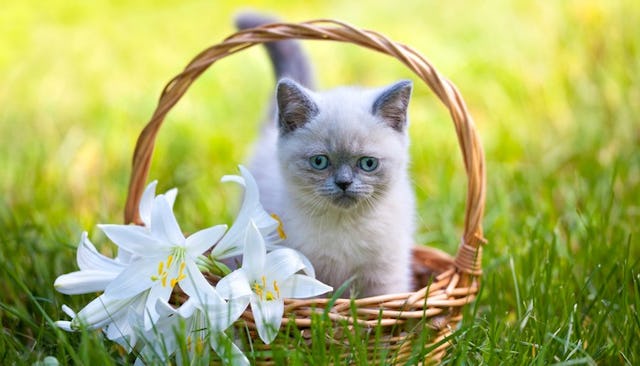PSA: If You Own A Cat, Think Twice About That Easter Lily

As spring approaches, the sights and smells of warmer weather are everywhere, particularly around Easter. Grocery stores and gardening centers are stocking their shelves with beautiful, fragrant flowers for us to plant in our yards and give as gifts to thank the hostess for cooking Easter dinner. And with Mother’s Day around the corner, flowers are the go-to gift — because let’s face it, who doesn’t want to make a mom smile with a cheerful bundle of color to put on the kitchen table?
As much as we love pretty blooms this time of year, some flowers can be harmful to our pets, particularly cats. If you have cat or are visiting with those who have a feline member of their family, you’ll want to be careful about what kinds of flowers you bring into the house.
I’m just finding out about this, and I’m not sure if I’m late to the game or what, but a favorite flower this time of year, the lily, can be deadly to cats. While not all forms of lilies are dangerous (Peace, Peruvian, and Calla can cause minor irritations in a cat’s mouth and nasal passages, but otherwise no serious damage), other popular forms of lilies can cause acute kidney failure in cats that have ingested certain parts of them. In fact, even a few petals can cause a lethal reaction. Yikes.
According to the website Pet Poison Hotline, “The more dangerous, potentially fatal lilies are true lilies of the Lilium or Hemerocallis species. Examples of some of these dangerous lilies include the tiger, day, Asiatic hybrid, Easter, Japanese Show, rubrum, stargazer, red, Western, and wood lilies.” These lilies are highly toxic and should be kept away from cats at all costs. Even the ever-popular Lily of the Valley is toxic, so be cautious when choosing groundcover plants for your garden (think about those neighborhood kitties who stroll through your yard too).
Basically, you’ll need to rethink that Easter lily if there are cats in the home. No one wants to be the person who accidentally kills someone’s beloved pet, right? Or at the very least, if you simply must gift an Easter lily, do keep an eye on kitty because cats are known to be flower nibblers, and even the water or pollen can cause a serious reaction.
If you suspect your cat has been exposed to a poisonous lily species, don’t wait for symptoms to occur because it might be too late to help your sweet kitten. Instead, notify your veterinarian immediately and be prepared to take your cat for emergency treatment.
So as you head out to Easter dinner or prepare to host the masses at your house, maybe skip the lily and opt for a bouquet of chocolate flowers for the hostess. Or better yet, bring wine. She’ll probably like that even more.